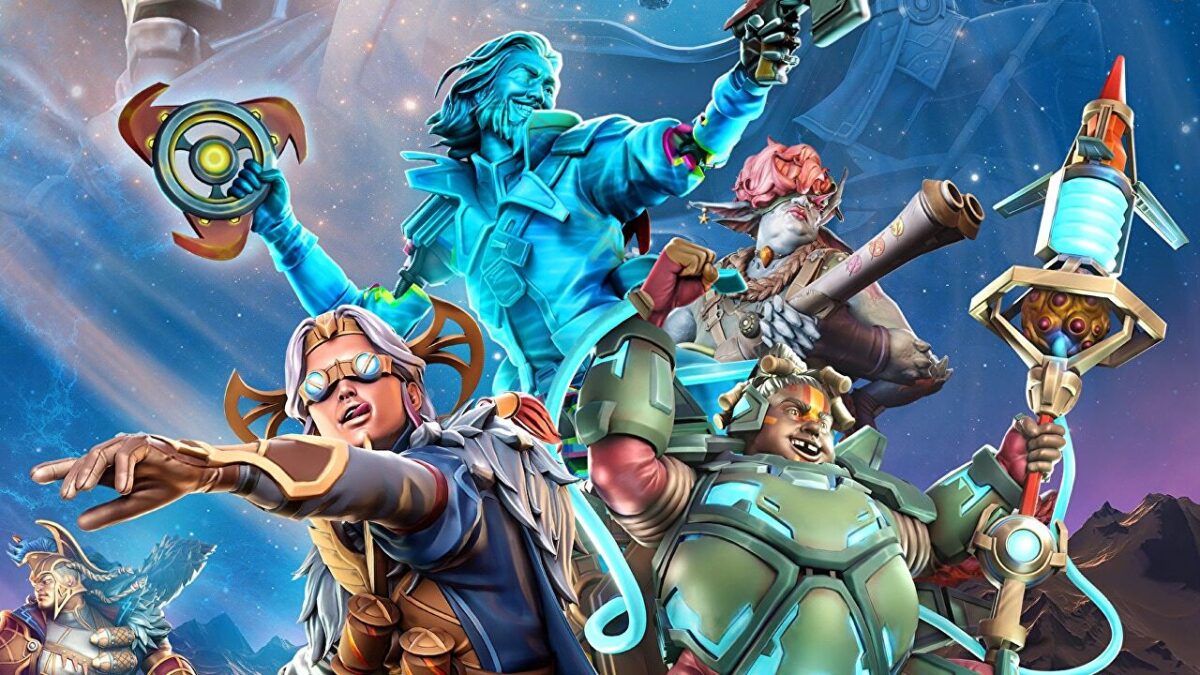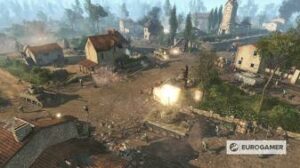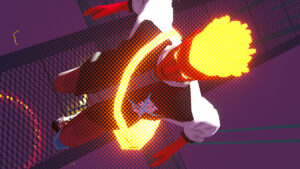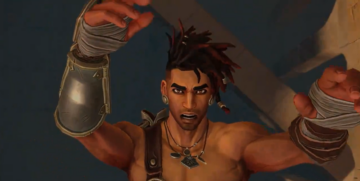After two games of terrifying deep sea survival, Subnautica developer Unknown Worlds is heading in a very different direction for its next project – a tabletop-inspired turn-based tactics game going by the name Moonbreaker, entering Steam early access on 29th September.
On a fundamental level, Moonbreaker, which has been in development for around five years, is surprisingly straightforward; each game sees players – either working against a human or AI opponent – strategising their way around a board, using careful positioning to their advantage as they work to annihilate the opposing player’s Captain.
So far so straightforward, but the complexity arrives when you begin factoring in the tactical options available to players during a match, including the likes of cover – which can either impenetrable or penetrable with an accuracy cost – plus Captains, crew members, ship assists, and resource management.
Captains are essentially Moonbreaker’s spin on hero characters, each having their own distinctive special abilities, while crew rosters are formed pre-match and consist of ten smaller units, each with their own strengths, abilities, and combat preferences – be that melee or ranged. Once crews are assembled and a game begins, players must protect their Captains and can summon units throughout play (these become active on the next turn) with a maximum of six crews units on the board per side at any time.
Ship assists, meanwhile, are essentially powerful bonus attacks that players settle upon at the start of a match, choosing from one of three available pairs. These moves must recharge over time and – as with almost everything that occurs during a game – must be activated by spending Moonbreaker’s core resource, Cinder, with players able to carry over a maximum of three Cinder a round if none is using during the previous turn.
And that – aside from an intriguing boss-battering rogue-like twist on the experience for solo players – is pretty much it on a basic level. And if that was all there was to Moonbreaker, I’d say it looks like a solid enough foundation for a tactics game and move on until we’ve had chance to play more. But Moonbreaker comes with one particularly appealing gimmick, and that’s an almost slavish dedication to replicating the analogue experience of playing real-life table-top games – in part, says Unknown Worlds, to make a costly hobby more accessible to people.
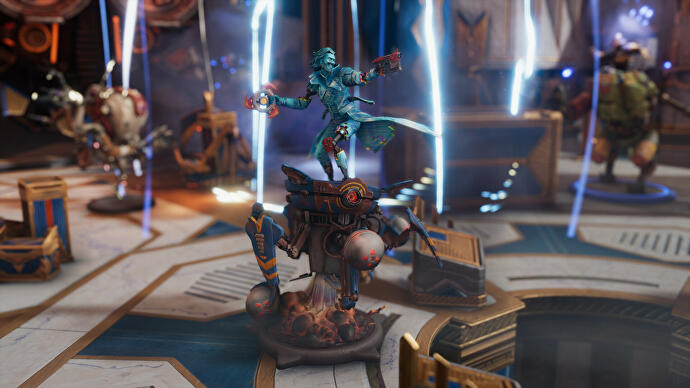
Maps, for instance, are designed to look like they’ve been hand-crafted using resin, grass texture paints, and any other materials a real-life builder might use, and that aesthetic carries through to the characters themselves, all represented by wonderfully distinct miniatures that, rather than being animated, wobble cheerily around the board on their bases as they move.
But the “analogue” angle goes further than that, with Moonbreaker including fully featured in-game customisation tools designed to replicate the miniature-painting experience as closely as possible, albeit with a handful of niceties such as an undo function and masking ability to help painters stay between the lines. All units come with a default paint job (created by real-life miniature painters that Unknown Worlds contacted) but if players want to flex their own creative muscles, they can apply base coats, paint, wash, dry brush, airbrush, stipple, glow paints, metallic paints, decals, and so on, even physically mixing paints to make their own colours.
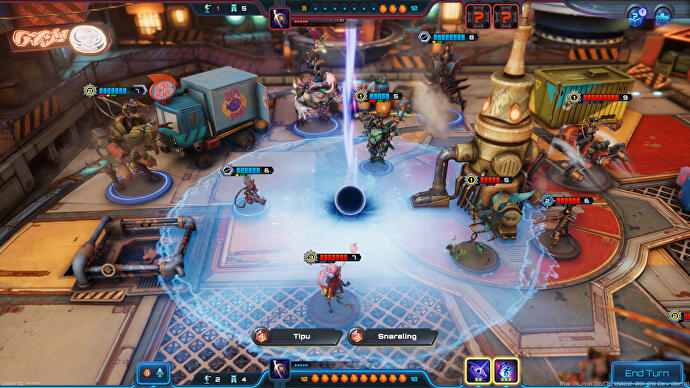
It’s an attention to detail that, based on an early showing for press, is evident elsewhere in Moonbreaker – including in its expansive lore, created with Mistborn author Brandon Sanderson and informing everything from Captains to individual units. Unknown Worlds even plans to release fully voiced audio dramas, telling the story of each new Captain as the roster grows.
Three Captains will be made available over the course of Moonbreaker’s early access launch season – holographic smuggler Zax Ja’kar, former deathbot Extilior, and Astra, a young girl in search of her father – and those will be accompanied by around 50 Crew characters. Expect that roster to grow roughly every four months, with each new season bringing more Captains and crew units, plus a new Battle-Pass-style seasonal track, unlocking the likes of in-game currency, sticker packs and decals, new paint sets, new banners, alternative unit paint schemes, and loot-box-style Booster Packs as players gain experience and climb its various tiers.
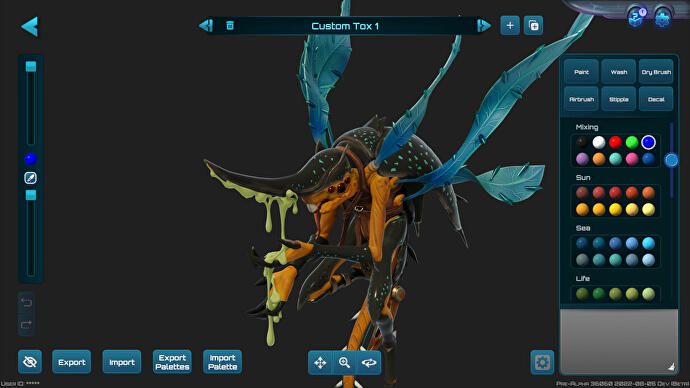
Booster Packs, incidentally, are said to be the primary way players can expand their crew roster in Moonbreaker. They’re earnable both in-game and through a premium currency store, with each pack including three random units of a random Rarity Aura (duplicates are converted into Merits, which can be used to “craft” unowned or higher rarity units).
Unknown Worlds insists all Captains, Crew, and maps can be unlocked just by playing the game, but lingering questions around Moonbreaker’s monetisation do remain. Despite the inclusion of loot boxes and a premium store, for instance, players will need to pay for Moonbreaker’s early access, with Unknown Worlds and publisher Krafton only willing to say that a later transition to a free-to-play model is “something being considered”. For the price of early access admission though, players will get access to the season track, three starting Captains, 10 Crew, and 10 Booster Packs, which Unknown Worlds says is “enough to acquire ‘common’ versions of all Crew members available in the game at launch”.
Whether that initial offering proves palatable to Moonbreaker’s target audience remains to be seen. We’ll have a better idea of how all this might pan out when Moonbreaker arrives in Steam early access on 29th September.
